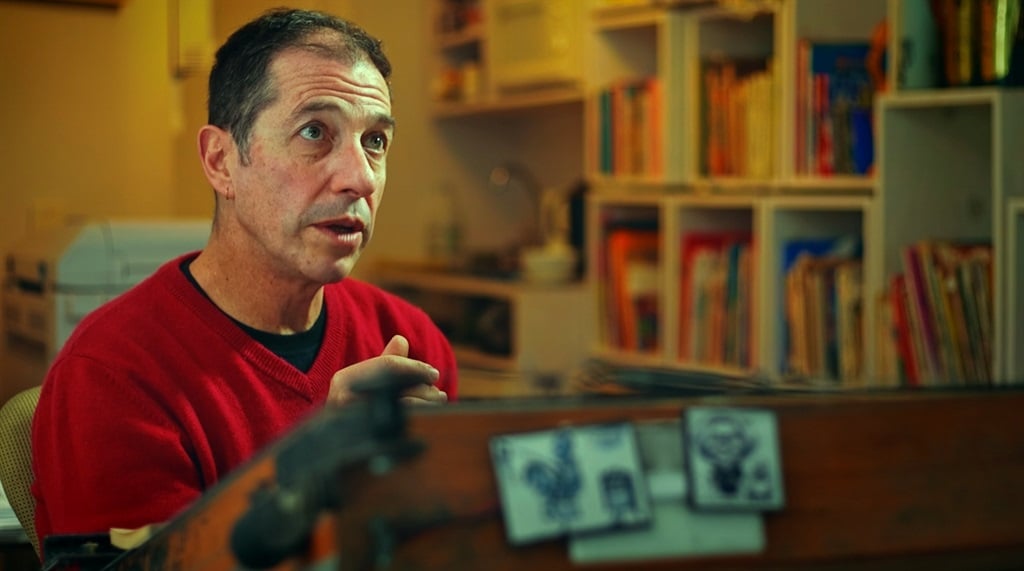
Zapiro in The Showerhead. (Supplied)
- Filmmaker Anant Singh and cartoonist Zapiro are challenging the 16LNPSV rating given to their documentary The Showerhead, and they plan to appeal the decision.
- The rating limits the documentary’s accessibility, which could significantly reduce its audience when it is released in cinemas this September.
- The film, which celebrates freedom of expression through Zapiro’s cartoons, ironically faces censorship, sparking debates on artistic freedom versus content regulation.
Filmmaker Anant Singh and cartoonist Zapiro strongly criticise the South African Film and Publication Board for assigning a 16LNPSV rating to their new documentary, The Showerhead. They have announced plans to appeal this decision from the “censor panel” early this week.
The Showerhead, directed by Craig Tanner and produced by Videovision Entertainment, had its world premiere Saturday night at the 45th Durban International Film Festival (DIFF). However, it has been slapped with a punitive 16LNPSV rating over its content.
This means that The Showerhead—a documentary profile of the cartoonist Jonathan Shapiro, known as Zapiro—will be seen and accessible by a much smaller potential audience when it’s released in cinemas in September.
The FPB’s 16LNPSV rating means that The Showerhead contains occurrences of moderate and possibly strong impact sexual activity, strong offensive language, nudity, prejudice, sex and violence.
Videovision Entertainment, which produced the film, will lodge an appeal with the Appeals Tribunal early this week.
The title The Showerhead originates from Zapiro’s depiction of former president Jacob Zuma with a showerhead. This artistic choice began after Zuma’s 2006 rape trial, where he confessed to having unprotected sex with a young woman who was HIV-positive. Zuma said that he showered afterwards to prevent himself from getting HIV/AIDS.
The Showerhead is a documentary about Jonathan Shapiro’s life. It tells his story from his early years as a liberation artist and political detainee during apartheid to his emergence as a defender of freedom of expression and his no holds barred career as a cartoonist.
Through interviews, the film explores how Zapiro’s cartoons have captured the essence of various issues plaguing South Africa in the post-Nelson Mandela period, such as corruption and threats to freedom of expression.
Craig Tanner says, “The irony of a film about freedom of expression having extreme restrictions placed upon those who might wish to see it is plainly lost on the guardians who sit on this censorship panel, purporting to discharge what they consider to be their duty of ensuring that young minds are not troubled or encouraged to think”.
“Suppression of The Showerhead on the basis that it involves sex and violence illustrates that the members of this panel have failed to appreciate the distinction between gratuitous depiction of such activities and use of metaphor as a creative device to explain social and political issues.”
“These are, after all, cartoons that have been published in newspapers, are familiar images in the public domain, and have been the subject of discussion, delight, offence and litigation on the national stage for years.”
Jonathan Shapiro says he was “genuinely taken aback and extremely disappointed when told that The Showerhead has been given a 16-age restriction.”
He adds:
To describe this restriction as an overreaction on the part of the censorship panel would be an understatement. A panel such as this one, misconstruing the nature of this movie in this way, is reminiscent of the kind of restrictions imposed on us during the apartheid era by the old censorship board. I hoped we had progressed somewhat beyond this.
He says, “A 16 rating also removes the possibility of showing the movie in schools where my cartoons are widely used in classrooms, in exam papers and in textbooks and in a number of subjects: history, art, economics, English and other languages”.
“I have often shown the most controversial cartoons in this movie at school presentations where I have encountered young people engaging in the issues raised by the cartoons. Trying to suppress young people from thinking, engaging, and questioning is not only futile but, in my opinion, reactionary. I earnestly hope that the appeal board will assign a more appropriate rating.”
Producer Anant Singh says, “The films that Videovision and I have produced and distributed have always been at the forefront of telling stories that supported freedom of expression and spoke out against injustices. Jonathan has done the same with his cartoons over the last four decades”.
“This rating goes against the very essence of Jonathan’s work and is a threat to freedom of expression in our land. It also goes against the clear directive of our constitution. We hope the appeal is successful and removes all the restrictions.”
Over the weekend, the FPB was asked several questions about the rating and for comment. The FPB didn’t respond by the time of publication on Monday, but its reaction will be added here when received.
READ MORE | Documentaries that matter: Insights from the 26th Encounters festival






Recent Comments